
- Home
- /
- Kidney Health
- /
- Your Dialysis Machine
Your Dialysis Machine
Article posted in:
Dialysis, Kidney Health
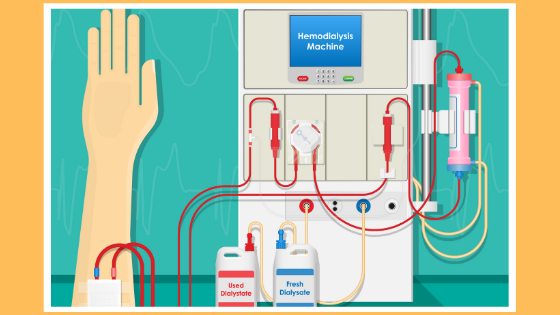
Our dialysis machines are like our engines, it’s what helps keep us running. Like an engine in a car it has so many parts that do so many things, all for one purpose, make the car go. So how does our dialysis machine actually work? And where did the idea even come from to create one?
How does a dialysis machine work?
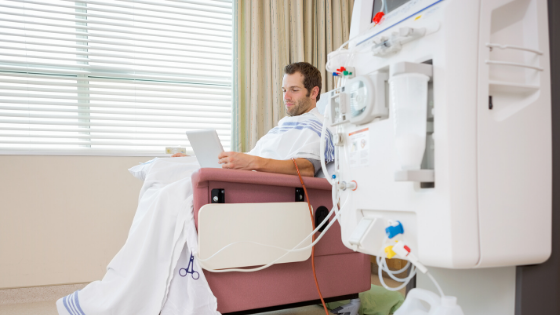
The purpose of your dialysis machine is for it to filter toxins out of your blood! The toxins that it filters out of your blood are; urea, creatinine, potassium (1).
The machine does this with 3 main functions:
- The catheters that transfer your toxic blood into the machine through tubes
- The dialyzer, which uses dialysate fluid to help remove and filter toxins in your blood
- The tubing that comes out of the dialyzer which contains toxin-free blood and enters back into your body
The main function here is the dialyzer which utilizes the dialysate fluid. This fluid helps remove the unwanted waste products from your blood. It also helps level out electrolytes and minerals to the necessary level in your body (2).
The dialyzer allows your blood and the dialysate fluid to flow through the machine at the same time. During this process, it is important to note that your blood and the dialysate never mix together or even touch while being passed through the dialyzer. Once impurities are filtered from your blood they are then transferred into the dialysate fluid which is then discarded properly. This process will continue for the entirety of your session, which to some patients can be six hours a day.
Who invented the dialysis machine?

Dr. Willem Kolff MD, PhD
Dr. Kolff’s idea wasn’t exactly the dialysis machine we have today. His idea was referred to as the artificial kidney and would inspire the technology advances we have available today.
Would you believe that all it took was laundry tubs, a wooden drum, metal, a semipermeable sausage casing, and an electric motor to create the first dialysis machine?
Dr. Kolff’s idea was this: “if a machine could replace the failing kidney for a few days to weeks, filtering out acid and waste materials from the blood, then the kidney tissue could regenerate and function again” (3).
How did he do it?
So he conducted his experiment by filing the sausage casing with blood and added the uremic toxin Urea (which is a kidney waste product) and shook it up in saltwater. From this Dr. Kolff was able to see that some urea had passed through the sausage casing and into the saltwater leaving no disturbance to the blood molecules used. Hence, the idea of dialysis was born (3).
Dr. Kolff was able to successfully use this theory on patients and help extend the lives of those affected by low functioning kidneys.
Later on, in 1948 Dr. Kolff was invited to work alongside Dr. Carl Walters and Dr. John Merrill to redesign the artificial kidney for kidney transplant program use.
Take a look at the evolution of the dialysis machine here.
The continued search for a better way
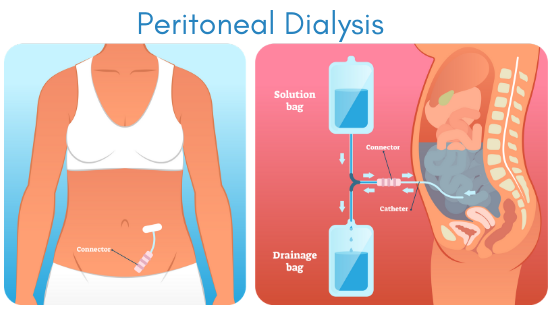
If you’re on dialysis and take medications for your low functioning kidneys, don’t give up hope that there is a better form of treatment coming to kidney care.
Because kidney disease is on the rise and is the 9th leading cause of death in the United States (4) it has now become a top priority for the United States government to continue research and development on dialysis alternatives.
Organizations such as KidneyX, were formed as the result of a partnership between the US Department of Health and Human Services (HHS) and the American Society of Nephrology (ASN). KidneyX has been engaging with researchers and innovators to find the next big idea in kidney care to help prevention, diagnostics, and treatment.
Learn more about KidneyX here https://www.kidneyx.org/
The Take Away
The world of medicine is always changing and improving, and with the emphasized importance of kidney care let’s continue to support those in our community who are helping us think of new and improved ways to live with low functioning kidneys.
If you are currently on dialysis and are considering moving to home hemodialysis read this article from Dr. Jenna Henderson about her own personal story of moving from in center to at-home hemodialysis. https://kibowhope.com/moving-to-home-hemodialysis/
Remember, consult with your healthcare practitioner to see if you are at risk of kidney problems.
For more on kidney health, be sure to follow and subscribe.

Temple University Graduate aiming to provide meaningful and useful content to those searching for information regarding their health. “It matters to me how my work affects others, and I am happy to be apart of something so wonderful”.
Nicole can be reached at Nicole@kibowbiotech.com
References
- National Kidney Foundation. (2020, April 16). Hemodialysis. Retrieved from https://www.kidney.org/atoz/content/hemodialysis
- Joe S. Davita. (n.d.). How does a dialysis machine work. Retrieved from https://www.davita.com/treatment-services/dialysis/in-center-hemodialysis/how-does-a-dialysis-machine-work
- American Society of Nephrology. (n.d.). Willem Kolff: Honoring a pioneer of modern dialysis. Retrieved from https://www.kidneynews.org/kidney-news/features/willem-kolff-honoring-pioneer-of-modern-dialysis
- Centers for Disease Control and Prevention. (2020, February 7). Chronic Kidney Disease Basics. Retrieved from https://www.cdc.gov/kidneydisease/basics.html
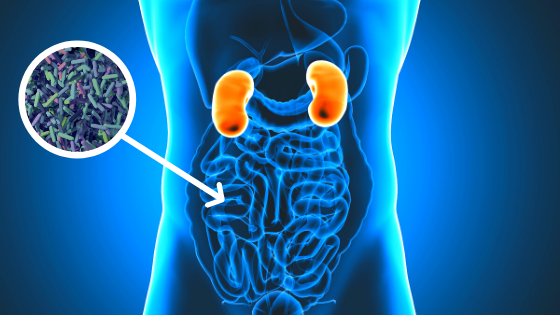
The immune system is crucial for our overall health and well being. It helps protect us against unwanted pathogens, viruses, bacteria, and more. Having an immune system is essential for survival. The immune system spreads out throughout the body and is involved with multiple organs, including the kidneys. (1)
The Immune System and Impaired Renal Function
This system has a direct impact on the progression of impaired renal function. Pathogenic immune responses against renal autoantigens often target the kidneys. (2) Antigens are molecules capable of stimulating the immune system response. (3) When kidney function begins to fail, there is an increase in the susceptibility of contracting an infection. On top of this, failing kidney function also leads to an exaggerated inflammatory response, which may have detrimental effects. (2)
Why is this important?

Having a robust immune system is vital for everyone, even people with optimum health. Without this crucial system, we would be susceptible to attacks from viruses, bacteria, parasites, and more. Once the body produces an antibody, a copy of it remains in the body. When the antigen enters the body again, it is ready to fight it off. (1)
What to look out for:
- Frequent infections
- This is one of the most common signs of weakened immunity. Not only can these infections take longer to heal, but the person is also more likely to experience frequent ones. (4)
- Always tired or fatigued
- High-stress level
- Stomach issues
- Always have a cold
How can you naturally balance the immune system?

This can be achieved through several natural remedies. For example, taking certain supplements, like probiotics, prebiotics, and Vitamin C may help balance immunity.
Other ways include getting enough recommended sleep each night and also taking steps to reduce stress. To read more on natural ways to balance the immune system, click here.
Taking care of our immunity is important! Remember to always consult with your healthcare practitioner to find out which natural remedies may be best for you.

Bridget Bagnell is a Marketing Associate at Kibow® Biotech Inc, the makers of Renadyl™. Bridget is a writer for The Hope and also for the official Renadyl™ blog. Aside from writing, she also works with Kibow Flora™ & Kibow Fortis® (pre and probiotic dietary supplements). She is a West Chester University graduate with a bachelor’s degree in Marketing. In her free time, Bridget enjoys traveling and spending time with family and friends. Bridget can be contacted at bridget@kibowbiotech.com.
Citations
1: Newman, T. (2018, January 11). The immune system: Cells, tissues, function, and disease. Retrieved from https://www.medicalnewstoday.com/articles/320101
2: Kurts, C., Panzer, U., Anders, H.-J., & Rees, A. J. (2013, September 16). The immune system and kidney disease: basic concepts and clinical implications. Retrieved from https://www.nature.com/articles/nri3523
3: Technology Networks. (2018, August 30). Antigen vs Antibody – What Are the Differences? Retrieved from https://www.technologynetworks.com/immunology/articles/antigen-vs-antibody-what-are-the-differences-293550
4: Weak immune system: Symptoms and what to do. (n.d.). Retrieved from https://www.medicalnewstoday.com/articles/324930#takeaway
Categories
Recent Posts
- Check out these Live Testimonials, thanks to Steve the Kidney Nurse February 15, 2022
- Kidney Friendly Infused Water August 20, 2020
- Is salt bad for the kidneys? August 12, 2020
- Drinking Water With Kidney Problems August 7, 2020
- What is Renadyl Used For August 5, 2020
Recent Comments
- Kibow Biotech on Drinking Water With Kidney Problems
- Santos Gonzalez on Drinking Water With Kidney Problems
- James F Hawkins III on Drinking Water With Kidney Problems
- Loretta on Kidney-Friendly Dessert
- Leo on Kidney-Friendly Summer Meal

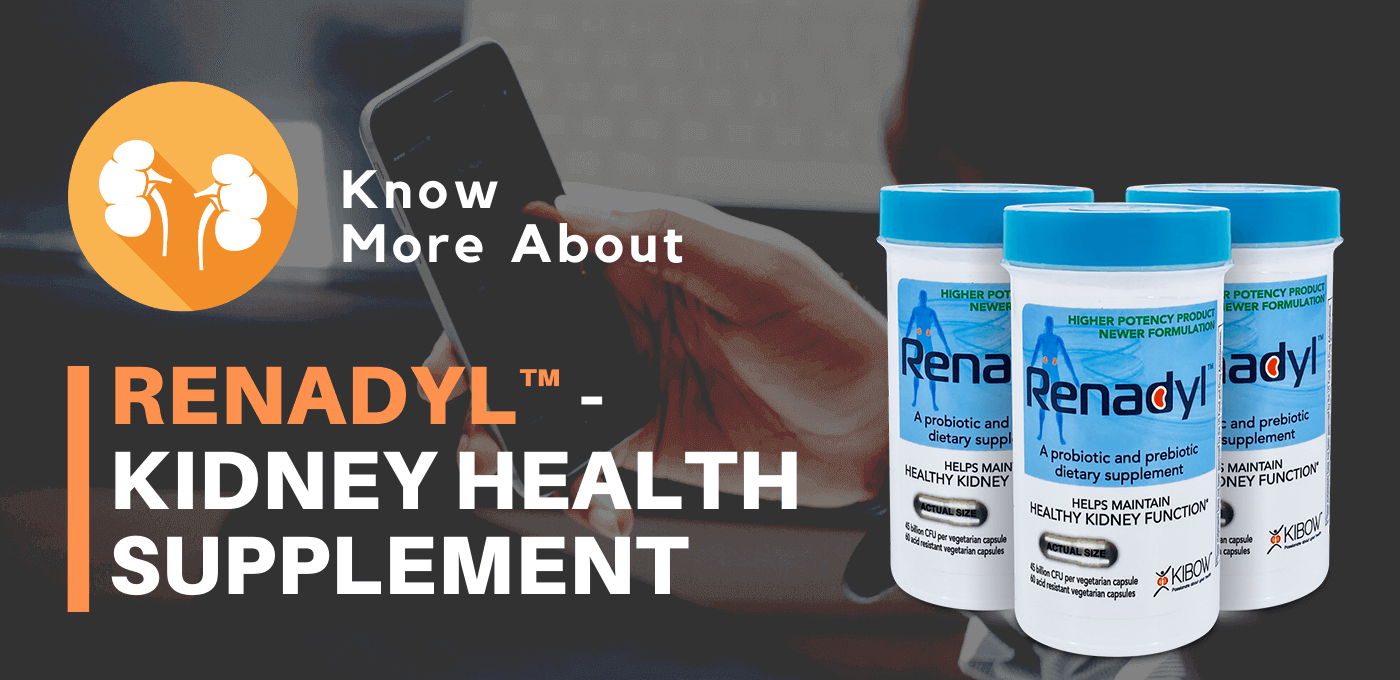

Comments
Leave a Comment